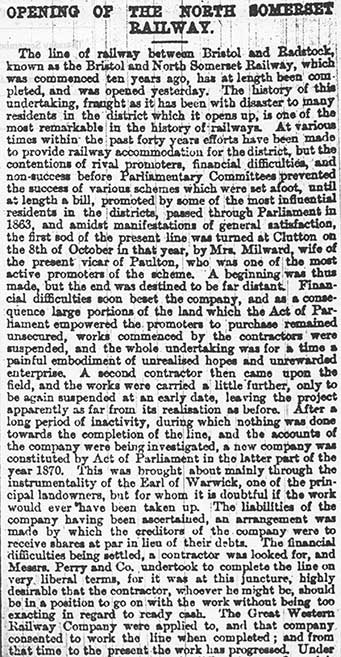Batch Chronicle
Thursday 4th September 1873

Opening of the North Somerset Railway
The line of railway between Bristol and Radstock, known as the Bristol and North Somerset Railway, which was commenced ten years ago, has at length been completed, and was opened yesterday. The history of this undertaking, fraught as it has been with disaster to many residents in the district which it opens up, is one of the most remarkable in the history of railways. At various times within the past forty years efforts have been made to provide railway accommodation for the district, but the contentions of rival promoters, financial difficulties, and the non-success before Parliamentary Committees prevented the success of various schemes which were set afoot, until at length a bill, promoted by some of the most influential residents in the districts, passed through Parliament in 1863, and amidst manifestations of general satisfaction, the first sod of the present line was turned at Clutton on the 8th October in that year, by Mrs Milward, wife of the present vicar of Paulton, who was one of the most active promoters of the scheme. A beginning was thus made but the end was destined to be far distant. Financial difficulties soon beset the company, and as a consequence large portions of the land which the Act of Parliament empowered the promoter to purchase remained unsecured, works commenced by the contractors were suspended, and the whole undertaking was for a time a painful embodiment of unrealised hopes and unrewarded enterprise. A second contractor then came upon the field and the works were carried a little further, only to be again suspended at an early date, leaving the project apparently as far from its realisation as before. After a long period of inactivity, during which nothing was done towards the completion of the line, and the accounts of the company were being investigated, a new company was constituted by Act of Parliament in the latter part of the year 1870. This was brought about mainly through the instrumentality of the Earl of Warwick, one of the principal landowners, but for whom it is doubtful if the work would ever have been taken up. The liabilities of the company having been ascertained, an arrangement was made by which the creditors of the company were to receive shares at par in lieu of their debts. The financial difficulties being settled, a contractor was looked for, and Messrs. Perry and Co. undertook to complete the line on very liberal terms, for it was at this juncture, highly desirable that the contractor, whoever he might be, should be in a position to go on with the work without being too exacting in regard to ready cash. The Great Western Railway Company were applied to, and that company consented to work the line when completed; and from that time to the present the work has progressed. Under the old regime as we have seen, the difficulties were financial, but latterly constructive difficulties have been the cause of chief concern, the heavy rains of the winter before last with the frequent landslips delaying the work. But in spite of this and of the failure and necessary reconstruction of the most expensive portion of the operations – the Pensford Viaduct - the work has since made rapid progress and is now completed. This viaduct is a magnificent work. It is of sixteen arches, its height to the level of the rail being 95 feet, and its length 995 feet. The viaduct is of stone, and it is surmounted by a parapet wall 18 inches in thickness. The length of the line is 15 ½ miles. The junction with the Great Western at Bristol is opposite the Avonside tannery, in St. Phillip's-marsh. There are stations at Brislington, Pensford (for Chew Magna and Chew Stoke), Clutton, Hallatrow, Welton (for Midsomer Norton, Farrington Gurney, and Paulton), and Radstock which is the terminus. At present only a single line of rails has been laid, but the arches are wide enough for a double line if necessary. The line is on the narrow gauge system, and though the gradients are heavy the curves are easy, the sharpest being a radius of twenty chains. On account of the stiff gradients the journey from end to end will occupy an hour. The Great Western Company, as we have said, will work the line, and at present it is intended to run four trains a day except Sunday, which will be a dies non upon the branch. The government inspector, Colonel Rich, went over the iron road last Thursday and Friday, and after a thorough examination of all the works expressed his full approval of their efficiency. That the line will be a great advantage to the public there can be no doubt. Besides opening up communication with the extensive collieries of Lord Warwick and the Countess Waldegrave at Radstock and other mineral properties in the neighbourhood, it will open up a district rich in agricultural products, and there are several extensive breweries to the proprietors of which it must be a great convenience.
To return to the History Page - Simply close this window